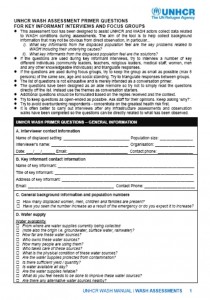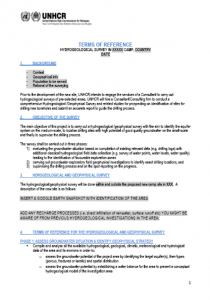
These sample terms of reference may be used should WASH actors working in refugee settings with to engage the services of a Consultant to carry out hydrogeological surveys of pre-selected areas. The terms of reference cover the following areas…
Evaluating the groundwater situation based on compilation of existing relevant data (e.g. drilling logs) with additional classical hydrogeological field data collection (e.g. survey of water points, water levels, water quality) leading to the identification of favourable exploration zones
Carrying out groundwater exploratory field geophysical investigations to identify exact drilling locations, and
Supervising the drilling process and on the spot reporting on the progress.

Where required, UNHCR and WASH actors may use this template to develop a solid waste management action plan that describes a list of prioritised solid waste management activities in addition to WHO, WHAT, WHERE, WHEN and HOW they will be carried out.
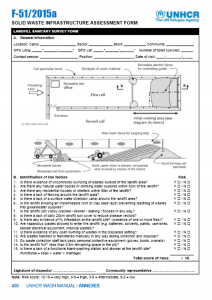
This form can be used to assess the refugee landfill site for public health and environmental sanitary risk factors.
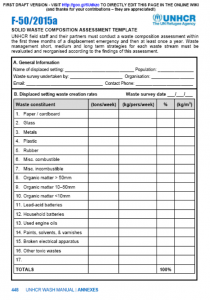
UNHCR field staff and their partners should conduct a waste composition assessment to assess the types of waste being produced and their and rates of production. Ideally the assessment should be carried out within the first three months of a displacement emergency and then at least once a year. Waste management short, medium and long term strategies for each waste stream should be revaluated and reorganised according to the findings of this assessment.

Where required, UNHCR and WASH actors should prepare a WASH related environmental impact assessment. This template should be used to assist in the process.

Where required, UNHCR and WASH actors should work together to develop a site level refugee WASH strategy document that clearly describes the refugee context, the baseline WASH situation, WASH coverage, WASH gaps, along with short (6 months), medium (6 months – 5 years) and long-term (>5 years) strategies for each of the WASH sub-sectors and the twelve (12) WASH principles. This template can be used to help produce the site level WASH Strategy.
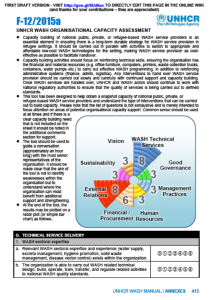
This tool has been designed to help obtain a snapshot capacity of national public, private, or refugee-based WASH service providers and understand the type of interventions that can be carried out to build capacity.
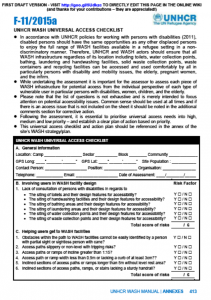
This document has been designed to help UNHCR and WASH actors assess WASH infrastructure for potential access from the individual perspective of each type of vulnerable user in particular persons with disabilities, women, children, and the elderly.
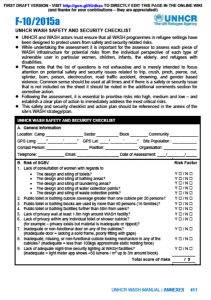
This document has been designed to help UNHCR and WASH actors assess potential WASH related safety and security issues related to trip, crush, pinch, pierce, cut, splinter, burn, poison, electrocution, road traffic accident, drowning, and gender based violence.
 English
English










